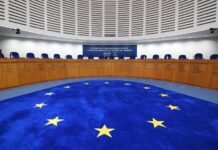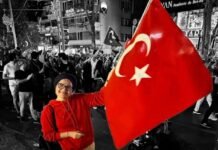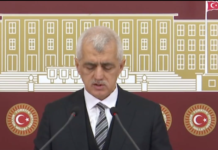The United Nations High Commissioner for Refugees (UNHCR) said in a statement on Thursday that the agency is deeply concerned by continued reports about alleged pushbacks and refoulement at the land border between Greece and Turkey.
“Such allegations of informal forced return have been recorded before, and it is of vital importance that the Greek authorities investigate them thoroughly,” said UNHCR Representative in Greece Philippe Leclerc.
“If confirmed, this is extremely worrying. The right to seek and enjoy asylum is a fundamental human right.”
“UNHCR has raised this issue with the Greek authorities, calling also for preventive measures against such practices, including clear rules of process at the border, independent monitoring mechanisms, and enhanced internal control structures,” the statement read.
Journalist Murat Çapan, who had been sentenced to 22.5 years for two news stories, is among those who were recently forced by a group of masked Greek men to cross the river back to the Turkish side.
The Hellenic League for Human Rights (HLHR) said in a statement on June 6 that Greek police continue illegally handing over Turkish asylum seekers to Turkey, a policy that results in “lambs to the slaughter.”
HLHR is the Greek branch of the worldwide monitoring group, the International Federation for Human Rights (FIDH).
“On 2 June at 9am, a family of six, including an infant, and three men who wished to apply for international protection in Greece because of persecution in Turkey were handed over by Greek police to a group of masked gunmen,” HLHR said.
“HLHR has in its disposal the license plate numbers of the Greek police van that transferred the asylum seekers. The new refoulement took place in Evros by boat, near Didymoteicho, and involved M.C., his wife and their four children, as well as Y.E., F.C., and one more man, whose name is still not known,” HLHR’s statement further said.
HLHR said it has already contacted the United Nations High Commissioner for Refugees and would bring the matter to the attention of Greek courts and tribunals.
“A certain measure of political and diplomatic equilibrium with our neighboring country is understandable. But this equilibrium should not be used to justify a policy that results in ‘lambs to the slaughter’. The rule of law must never debase in such a degree the value of human life and dignity,” the statement underlined.
The June 6 statement came days after another statement by the same institution. Murat Capan, the managing editor of the leading investigative magazine, Nokta, which was shuttered by the Turkish government in the aftermath of the July 15, 2016 coup attempt, was forced by a group of masked Greek men to sail back to Turkish side on May 24. Capan was earlier sentenced to 22.5 years in prison for two critical news stories.
In a separate statement on June 7, Nils Muiznieks, the Council of Europe’s commissioner for human rights, said he is also concerned about reported collective expulsions from Greece of asylum-seeking Turkish nationals.
“I urge the Greek authorities to cease immediately the pushback operations and uphold their human rights obligation to ensure that all people reaching Greece can effectively seek and enjoy asylum,” he said.
“No doubt Greece has been under immense migratory pressure in recent years. … However, even in particularly challenging situations, states cannot resort to practices – such as collective expulsions – which are not in compliance with the European Convention on Human Rights and the non-refoulement principle enshrined in the UN Refugee Convention,” he maintained.
A military coup attempt on July 15 killed over 240 people. Immediately after the putsch, the Justice and Development Party (AKP) government along with Turkey’s autocratic President Recep Tayyip Erdoğan pinned the blame on the Gülen movement.
Fethullah Gülen, who inspired the movement, strongly denied having any role in the failed coup and called for an international investigation into it, but President Erdoğan — calling the coup attempt “a gift from God” — and the government initiated a widespread purge aimed at cleansing sympathizers of the movement from within state institutions, dehumanizing its popular figures and putting them in custody.
According to a report by the state-run Anadolu news agency on May 28, 154,694 individuals have been detained and 50,136 have been jailed due to alleged Gülen links since the failed coup. (SCF with turkeypurge.com) June 9, 2017















